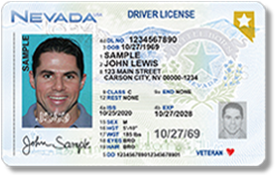Less than 1 year left to obtain Real ID before deadline

Barring another pandemic or other unforeseen event, the Real ID compliance date is just under a year away.
Beginning May 3, 2023, anyone who doesn’t have a valid passport or military ID must obtain a Real ID to fly domestically in the United States.
After that date, the Transportation Security Administration will no longer accept state-issued driver’s licenses as valid identification purposes at airports.
“Check your license or ID card. If it has a gold star in the upper right corner, then you already have a Real ID and you’re good to go,” DMV Director Julie Butler said in a statement.
The deadline for Real ID compliance originally was set for fall 2020, then pushed to 2021. Then it was extended to next year amid the ongoing COVID-19 pandemic.
The good news for Nevada is the state has a much higher percentage of residents who are already Real ID-compliant compared to the rest of the country. Over 71 percent of Nevada noncommercial driver’s licenses are Real ID-compliant. That’s above the national average of 49 percent, per the Department of Homeland Security.
As of the end of March, about 1.5 million of the approximate 2.1 million active Nevada driver’s licenses and instruction permits are Real ID-compliant, the DMV noted.
Just because you have a year to obtain a Real ID doesn’t mean you should put it off until the last minute. Since a DMV office visit is necessary to upgrade to a Real ID, the 29 percent of noncompliant motorists will have to schedule appointments to visit a DMV office.
If a resident has other upcoming DMV transactions that need to be carried out, the DMV suggests bundling those with applying for a Real ID. This can save a person extra time and trips to the DMV to complete these separately.
The Nevada DMV’s Real ID webpage has answers to many questions regarding the Real ID process and lists what documents will be needed to obtain one.
Documents needed to complete the Real ID process include:
Proof of identity: Valid driver’s license, instruction permit or identification card from Nevada or another state, or a valid, unexpired U.S. passport. A valid birth certificate is also accepted as a form of ID.
Proof of Social Security number: A valid Social Security card, a W-2, IRS Form 1099 or a printed pay stub with a person’s Social Security number included on it will be accepted.
Proof of Nevada residence: Motorists must present two forms of the following to prove state residency: lease record or receipt, bank or credit card statement, employment pay stub, document from a federal or state court, record from an educational institution, voter card.
Proof of name change: If a person’s name differs from the one on their documents, they must provide proof of legal name change. These documents will satisfy this requirement: marriage certificate, divorce decree, adoption records or a court order.
The new IDs are part of the Real ID Act, which is intended to combat terrorism and identity theft and other crimes by enhancing security of state-issued identification cards.
The Act was passed by Congress to enact the 9/11 Commission’s recommendation to set standards for sources of identification, including state-issued driver’s licenses and ID cards. It mandates the state DMV offices meet strict requirements on the security of the licensing process.
Contact Mick Akers at makers@reviewjournal.com or 702-387-2920. Follow @mickakers on Twitter. Send questions and comments to roadwarrior@reviewjournal.com.